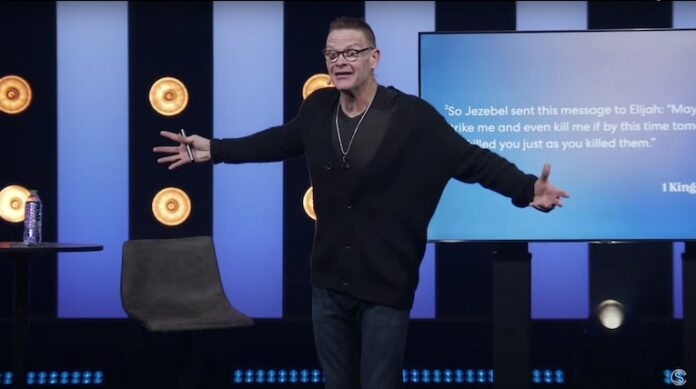On Facebook this week, Perry Noble, senior pastor of Second Chance Church in Anderson, South Carolina, shares some lengthy “Thoughts on Repentance.” In an 1,100-word post on October 25, Noble refers to his “colossal screw up in 2016” and describes how God’s grace transformed his heart, mind, and actions.
As Church Leaders reported, in 2016 Noble was removed as senior pastor of NewSpring Church, also based in Anderson, for alcohol abuse and other unbiblical behaviors. The megachurch, which Noble founded in 2000, had 17 locations and 30,000+ weekly attendees when he was ousted.
In 2017, Noble founded Second Chance Church as “a place where all people can experience the grace of God.”
Perry Noble: God Empowered My Change
Perry Noble, 51, begins by describing a childhood playground scuffle. After that incident, he blurted “I’m sorry” to avoid a spanking, “NOT because in my heart I knew it was the right thing to do.” That can be labeled as compliance, behavior modification, and control, he says, but not repentance.
“Repentance is not when a person changes their behavior,” writes Noble, “but rather when we allow Jesus to show us life through His eyes rather than our own…when we realize (because of our connection to Him) what we did was wrong…when we feel deep conviction over what we did.” Compared to guilt from being caught, “conviction is something that is brought about over time by the Holy Spirit…and is ALWAYS meant to correct us, not condemn us,” he adds.
Although Noble notes that other people “can absolutely speak into the process,” it must be Spirit-led to result in sorrow, change, and a desire to “make things right.” Key to his recovery in 2016, the pastor writes, was 2 Corinthians 7:10 (NIV): “Godly sorrow brings repentance that leads to salvation and leaves no regret, but worldly sorrow brings death.”
After rehab and outpatient therapy, Noble says, “Jesus allowed me to see things the way He saw them—to feel the way He felt about them… And because of that I was able to reach out to those who I knew had been hurt/offended the most and apologize for the part I had played in all that had taken place.”
By God’s grace, Noble was able to extend heartfelt apologies “for the hurt, pain and confusion I had caused for making poor, selfish and sinful decisions.” He adds. “Jesus changed me, in His time, because I asked Him to let me see and feel the way He saw and felt about me and my situation.”
The broader lesson for the church, Noble writes, is that people can’t be “guilted into” or judged into repentance. “Jesus didn’t die on a cross so the church could establish a behavior modification program by which church leaders lead through control and manipulation and label it ‘discipleship!’ He died so that He could come into our lives, change the way we think—so His ways could become our ways.”

